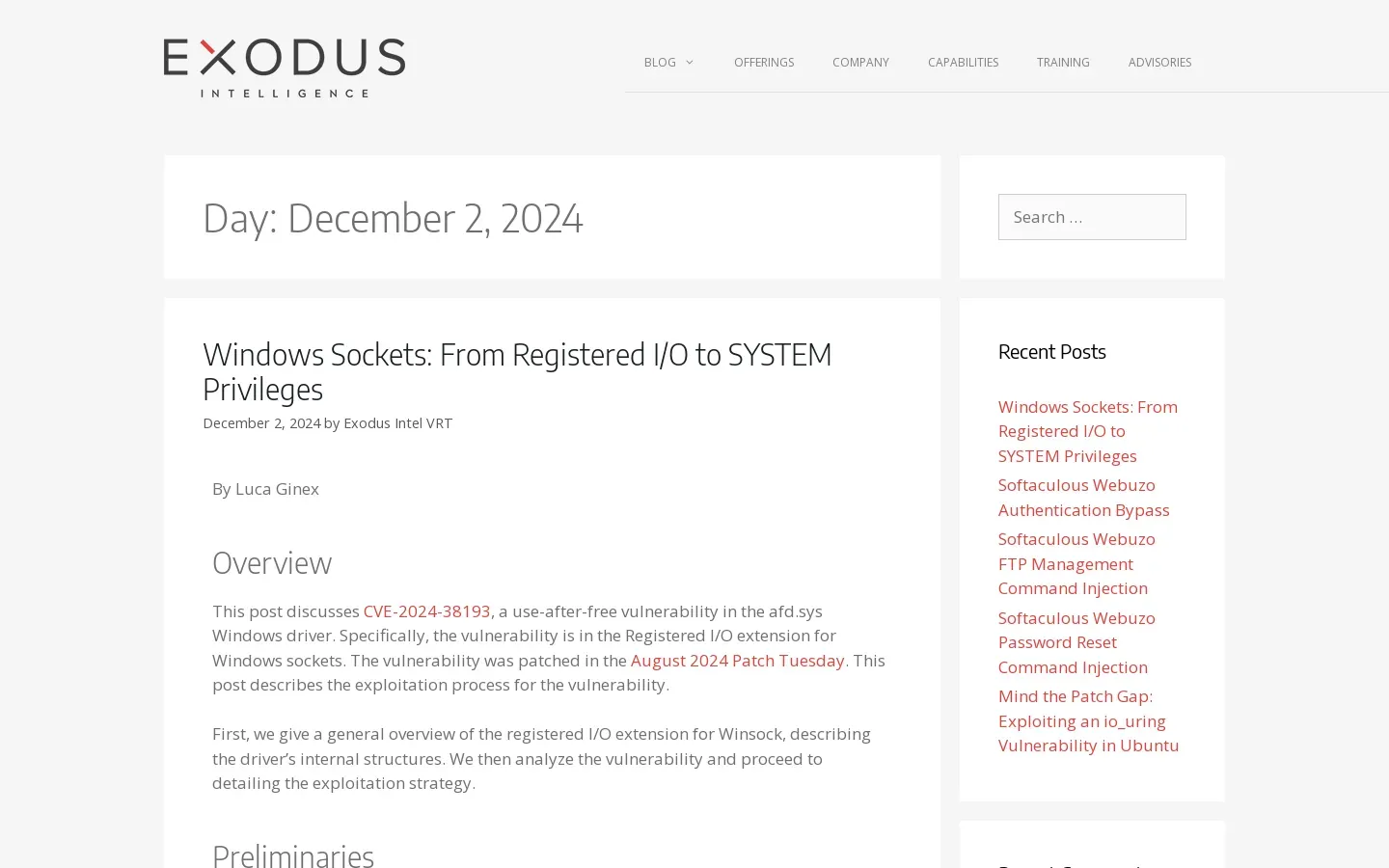
Critical Vulnerability CVE-2024-38193 Discovered in Windows Driver
/ 3 min read
Quick take - Recent research has identified a significant use-after-free vulnerability, CVE-2024-38193, in the afd.sys Windows driver related to the Registered I/O extension, which poses serious risks including privilege escalation and underscores the need for enhanced cybersecurity measures and patch management.
Fast Facts
- Vulnerability Overview: CVE-2024-38193 is a significant use-after-free vulnerability in the afd.sys Windows driver, linked to the Registered I/O (RIO) extension, posing risks of privilege escalation.
- Research Focus: The study analyzed the afd.sys driver, detailing its internal structures, workflows, and the exploitation process for the identified vulnerability.
- Exploitation Strategy: The research outlines a systematic approach to exploit the vulnerability and subsequent techniques for privilege escalation.
- Cybersecurity Implications: Findings stress the need for improved patch management, heightened scrutiny of race condition vulnerabilities, and enhanced kernel-level security awareness.
- Future Directions: The study calls for better vulnerability detection tools and empirical research on mitigation strategies for kernel vulnerabilities to improve cybersecurity practices.
Critical Vulnerability CVE-2024-38193 in Windows Driver afd.sys: An In-Depth Analysis
A newly identified vulnerability, CVE-2024-38193, has been discovered within the Windows driver afd.sys, specifically affecting the Registered I/O (RIO) extension for Windows sockets. This use-after-free vulnerability presents significant risks, including potential privilege escalation, and demands immediate attention from cybersecurity professionals and software developers.
Understanding the Vulnerability
The research aimed to dissect the afd.sys driver and its interaction with the RIO extension, focusing on internal structures and workflows such as buffer registration, usage, and deregistration. The vulnerability arises from a use-after-free condition that can be exploited to escalate privileges. Researchers have meticulously outlined the steps involved in triggering this condition and exploiting it.
Exploitation Strategy
The exploitation strategy is comprehensive, detailing how attackers could leverage this vulnerability. It involves:
- Analyzing the RIO Extension: Understanding its architecture and functionality.
- Identifying the Vulnerability: Delving into how CVE-2024-38193 manifests within the driver.
- Developing an Exploitation Approach: Systematically crafting methods to exploit the vulnerability.
- Privilege Escalation Techniques: Exploring ways attackers could gain elevated privileges post-exploitation.
Implications for Cybersecurity
The discovery of CVE-2024-38193 has several implications for cybersecurity:
- Focus on Race Condition Vulnerabilities: This vulnerability underscores the need for increased scrutiny of race conditions within system drivers.
- Patch Management Strategies: Organizations must enhance their patch management protocols to address vulnerabilities swiftly.
- Exploit Mitigation Techniques: There is a pressing need for advanced strategies to mitigate potential exploits from similar vulnerabilities.
- Kernel-Level Security Awareness: The findings have reignited discussions about securing kernel-level components against exploitation.
Research Strengths and Limitations
The research provides valuable insights into the mechanics of CVE-2024-38193, offering a comprehensive technical overview. However, it also acknowledges limitations, particularly concerning real-world applications of its findings and the effectiveness of proposed mitigation strategies.
Future Directions
The study suggests several future exploration avenues:
- Enhanced Vulnerability Detection Tools: Collaboration with software developers and security teams is essential to integrate improved detection tools into the software development lifecycle (SDLC) for early identification of vulnerabilities.
- Mitigation Strategies for Kernel Vulnerabilities: Empirical studies are needed to assess mitigation strategies’ effectiveness in practical scenarios, potentially leading to best practices in kernel driver development.
As cybersecurity threats continue to evolve, understanding and addressing vulnerabilities like CVE-2024-38193 is crucial for maintaining secure systems. Proactive measures and vigilance are necessary to protect against exploitation and ensure robust cybersecurity practices.



